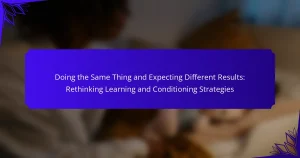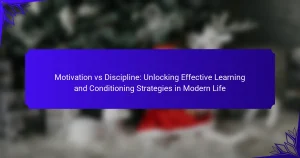To maximize profits, understanding what to sell and how to effectively communicate with customers is crucial. This article explores effective learning techniques, key attributes of successful sales strategies, and unique conditioning strategies that enhance customer engagement. Additionally, it highlights the importance of adaptability and emotional intelligence in sales training for improved outcomes. Implementing these insights can lead to increased sales performance and customer satisfaction.

What Learning Techniques Can Enhance Sales Strategies?
Effective learning techniques can significantly enhance sales strategies by improving skills and adaptability. Techniques such as role-playing, active listening, and data analysis foster a deeper understanding of customer needs. Role-playing simulates real sales scenarios, allowing salespeople to practice responses and refine their pitches. Active listening enhances communication, enabling sales professionals to address client concerns effectively. Data analysis aids in identifying trends, informing targeted sales approaches. Implementing these techniques leads to increased sales performance and customer satisfaction.
How Does Conditioning Influence Consumer Behavior?
Conditioning significantly shapes consumer behavior by creating associations between products and positive experiences. Through techniques like classical conditioning, brands can trigger emotional responses, making consumers more likely to purchase. For instance, pairing a product with attractive visuals or pleasant music can enhance brand recall and preference. As a result, marketers leverage these strategies to foster loyalty and drive sales, demonstrating the unique attribute of emotional engagement in consumer decision-making.
What Are the Key Learning Theories Applicable to Selling?
Key learning theories applicable to selling include behaviorism, constructivism, and experiential learning. Behaviorism focuses on conditioning and reinforcement, which can enhance sales techniques through reward systems. Constructivism emphasizes understanding customer needs and building relationships, fostering trust and loyalty. Experiential learning encourages sales professionals to learn through real-life interactions, improving their adaptability and effectiveness. Each theory provides unique strategies that can lead to increased sales success.
What Role Does Operant Conditioning Play in Sales?
Operant conditioning significantly influences sales by shaping customer behavior through reinforcement strategies. By rewarding desired actions, such as purchases or referrals, businesses can enhance customer loyalty and increase sales. Positive reinforcement, like discounts or loyalty points, encourages repeat purchases. A study found that 70% of consumers are more likely to return to brands that reward them, highlighting the effectiveness of these techniques. Understanding and implementing operant conditioning can drive sales success by creating a favorable customer experience.
How Can Classical Conditioning Be Used in Marketing?
Classical conditioning can enhance marketing by creating associations between products and positive experiences. Marketers can use this technique to build brand loyalty and influence purchasing decisions. For example, pairing a product with pleasant music or imagery can evoke positive emotions, making consumers more likely to buy. This strategy leverages the unique attribute of emotional connection to enhance consumer behavior. By consistently applying classical conditioning, brands can reinforce their messaging and increase customer retention.

What Are the Universal Attributes of Successful Sales Techniques?
Successful sales techniques universally share key attributes that drive effectiveness. These attributes include effective communication, understanding customer needs, building relationships, and demonstrating value. Each technique emphasizes adaptability, allowing salespeople to tailor their approach based on the audience.
Effective communication is essential; it involves clear messaging and active listening. Understanding customer needs requires research and empathy, enabling sales professionals to offer tailored solutions. Building relationships fosters trust, which is crucial for long-term success. Demonstrating value clearly shows how a product or service meets specific needs, reinforcing the decision to purchase.
Incorporating learning techniques and conditioning strategies enhances these attributes. For instance, role-playing can improve communication skills, while feedback loops help refine approaches based on customer interactions.
Ultimately, successful sales techniques are defined by their ability to connect with customers, adapt to changing circumstances, and consistently deliver value.
Which Learning Techniques Are Most Effective in Sales?
Active learning techniques, such as role-playing and simulations, are most effective in sales. These methods enhance engagement and retention, allowing sales professionals to practice real-world scenarios. Incorporating spaced repetition and feedback loops further solidifies knowledge and skills. Research indicates that experiential learning increases performance by up to 70%.
What Psychological Principles Drive Effective Selling?
Understanding psychological principles is crucial for effective selling. Key principles include reciprocity, scarcity, authority, consistency, and social proof.
Reciprocity involves providing value first, encouraging customers to return the favor. Scarcity creates urgency, prompting quicker purchasing decisions. Authority leverages expert opinions to build trust. Consistency emphasizes commitment, encouraging customers to stay loyal. Social proof showcases testimonials, reinforcing credibility.
By applying these principles strategically, sellers can enhance their effectiveness and drive sales success.

What Unique Conditioning Strategies Can Differentiate Your Sales Approach?
Unique conditioning strategies can significantly enhance your sales approach by tailoring techniques to specific customer needs. Employing behavioral conditioning, such as positive reinforcement, can build customer loyalty and encourage repeat purchases. Additionally, utilizing social proof as a conditioning strategy can influence buyer decisions, making them feel part of a larger community. Implementing personalized communication, based on customer data, can also create a unique connection, leading to higher engagement and conversion rates. These strategies differentiate your sales approach by fostering deeper relationships with customers and enhancing their overall experience.
How Can Personalized Learning Techniques Boost Sales Performance?
Personalized learning techniques can significantly enhance sales performance by tailoring training to individual needs. This approach increases engagement and retention, leading to better results. For instance, adaptive learning platforms adjust content based on performance, ensuring sales teams focus on areas needing improvement. Additionally, incorporating real-time feedback mechanisms allows for immediate adjustments, fostering a culture of continuous learning. As a result, organizations can expect higher sales conversion rates and improved team morale.
What Innovative Tools Are Available for Modern Sales Training?
Modern sales training employs innovative tools like virtual reality, gamification, and AI-driven analytics to enhance learning. These tools create immersive experiences, increase engagement, and provide personalized feedback, enabling sales professionals to refine their skills effectively. Virtual reality simulations allow trainees to practice real-life scenarios, while gamification fosters competition and motivation. AI analytics track progress and identify areas for improvement, ensuring targeted training. Together, these tools leverage advanced learning techniques to maximize sales success.
How Can Gamification Enhance Learning in Sales?
Gamification enhances learning in sales by increasing engagement and motivation. It incorporates game-like elements such as rewards and challenges to facilitate knowledge retention. This method encourages active participation, making learning enjoyable and effective. For example, sales teams using gamification report improved performance and higher retention rates. Additionally, gamification provides real-time feedback, allowing learners to track progress and adjust strategies accordingly. This unique approach transforms traditional training into an interactive experience, ultimately driving sales success.
What Role Does Data Analytics Play in Tailoring Sales Techniques?
Data analytics is crucial in tailoring sales techniques by providing insights into customer behavior and preferences. It allows businesses to identify trends, optimize strategies, and enhance engagement. By analyzing data, companies can segment their audience effectively, ensuring that sales approaches resonate with specific groups. This targeted strategy increases conversion rates and ultimately boosts revenue. Additionally, data analytics facilitates continuous improvement through performance tracking, enabling real-time adjustments to sales techniques for maximum effectiveness.

What Rare Attributes Should Be Considered in Sales Training?
To enhance sales training, consider rare attributes like adaptability, emotional intelligence, and real-time feedback. These qualities foster resilience, improve client interactions, and facilitate immediate learning adjustments. Focusing on these attributes can lead to more effective sales strategies and greater success.
What Are the Emerging Trends in Learning and Conditioning for Sales?
Emerging trends in learning and conditioning for sales focus on personalized training, data-driven insights, and gamification. Personalized training tailors approaches to individual learning styles, enhancing retention and engagement. Data-driven insights leverage analytics to refine strategies and measure effectiveness, leading to improved performance. Gamification introduces game-like elements to motivate and engage sales teams, fostering a competitive yet collaborative environment. These trends emphasize adaptability and innovation, crucial for achieving sales success in a dynamic market.
How Can Neuro-Linguistic Programming Influence Sales Success?
Neuro-Linguistic Programming (NLP) can significantly enhance sales success by improving communication and influencing buyer behavior. By leveraging techniques such as mirroring and reframing, sales professionals can create rapport and address objections effectively.
NLP encourages understanding of customer motivations, allowing for tailored pitches that resonate with individual needs. This approach enhances persuasion, leading to increased conversion rates. For instance, employing language patterns that align with a prospect’s preferred communication style can foster trust and openness.
Additionally, conditioning strategies in NLP help salespeople develop a positive mindset, reinforcing confidence and resilience in the face of rejection. This psychological conditioning can improve overall performance and persistence in sales efforts.
In summary, integrating NLP techniques into sales strategies not only influences buyer decisions but also equips sales professionals with tools to adapt and thrive in competitive environments.

What Are the Best Practices for Implementing Learning Techniques in Sales?
To successfully implement learning techniques in sales, focus on practical application and continuous improvement. Utilize techniques like role-playing, which enhances product knowledge and customer interaction skills. Incorporate feedback loops to refine strategies based on performance metrics. Encourage team collaboration to share insights and best practices, fostering a culture of learning. Regularly assess training effectiveness to adapt methods and maximize sales outcomes.
How Can You Optimize Your Sales Training Programs?
To optimize your sales training programs, focus on tailored learning techniques and conditioning strategies. These methods enhance retention and application of sales skills. Incorporate role-playing scenarios, real-life case studies, and interactive workshops to engage participants effectively. Utilize metrics to assess progress and adapt training accordingly. Continuous feedback loops ensure that the training remains relevant and impactful.
What Common Mistakes Should Be Avoided in Sales Conditioning?
To avoid common mistakes in sales conditioning, focus on understanding customer needs and building genuine relationships. Neglecting these aspects can lead to ineffective strategies.
Another mistake is relying solely on aggressive tactics without providing value. This approach can alienate potential customers.
Additionally, failing to track and analyze results can hinder progress. Regular assessment allows for necessary adjustments to strategies.
Lastly, overlooking the importance of ongoing training can limit a team’s effectiveness. Continuous learning ensures that sales techniques remain relevant and impactful.
What Expert Insights Can Help You Leverage Learning for Sales Success?
Expert insights highlight the importance of tailored learning techniques for sales success. By leveraging conditioning strategies, sales professionals can enhance their skills and adapt to customer needs more effectively.
First, focus on active learning methods, such as role-playing and simulations, which foster real-world application. Research shows that experiential learning increases retention rates by up to 75%.
Second, utilize data-driven insights to identify key attributes of successful sales techniques. For example, understanding customer psychology can lead to improved engagement and conversion rates.
Lastly, continuous learning and adaptation are crucial. The sales landscape evolves rapidly, and ongoing training ensures that teams remain competitive and informed. Emphasizing a culture of learning can significantly impact overall sales performance.


